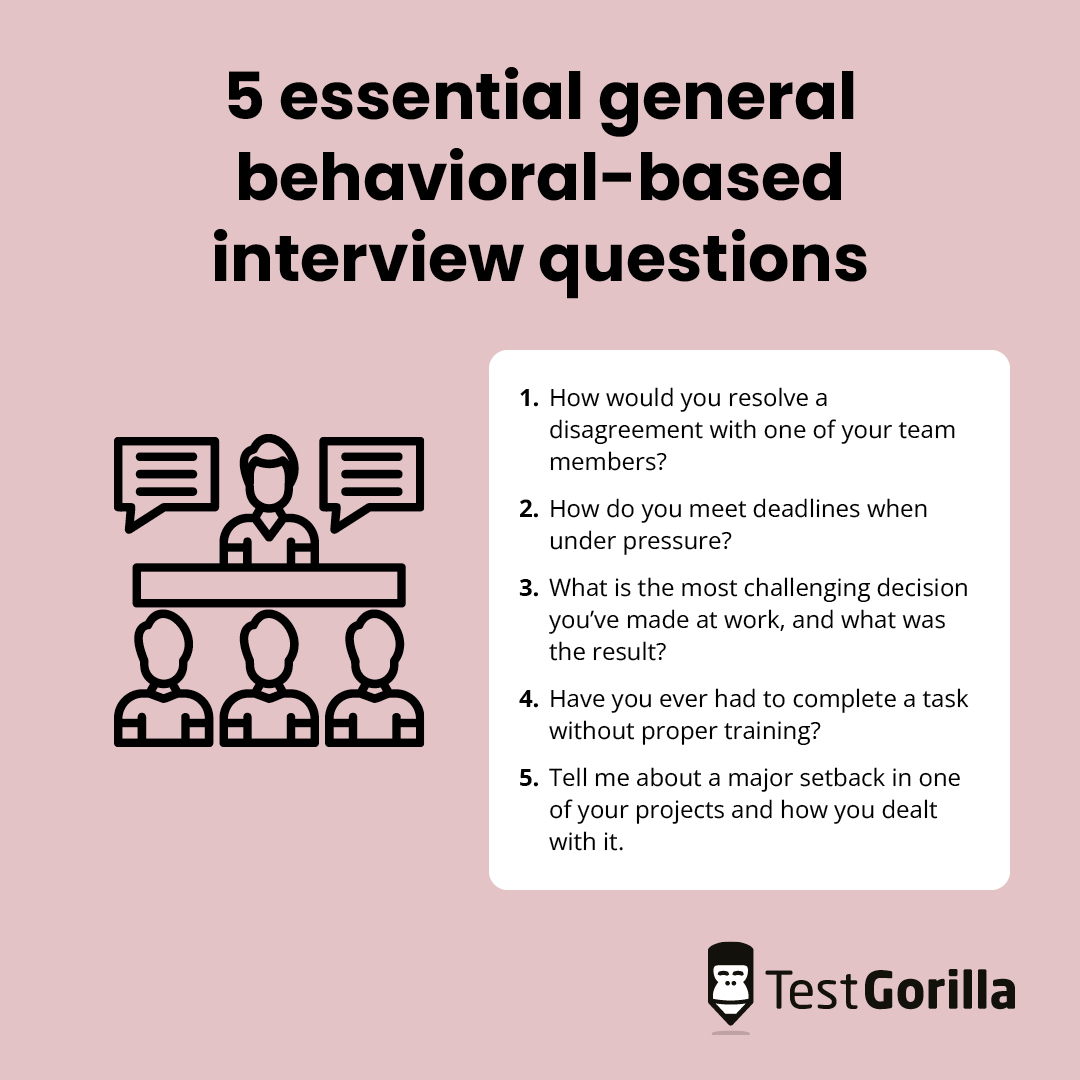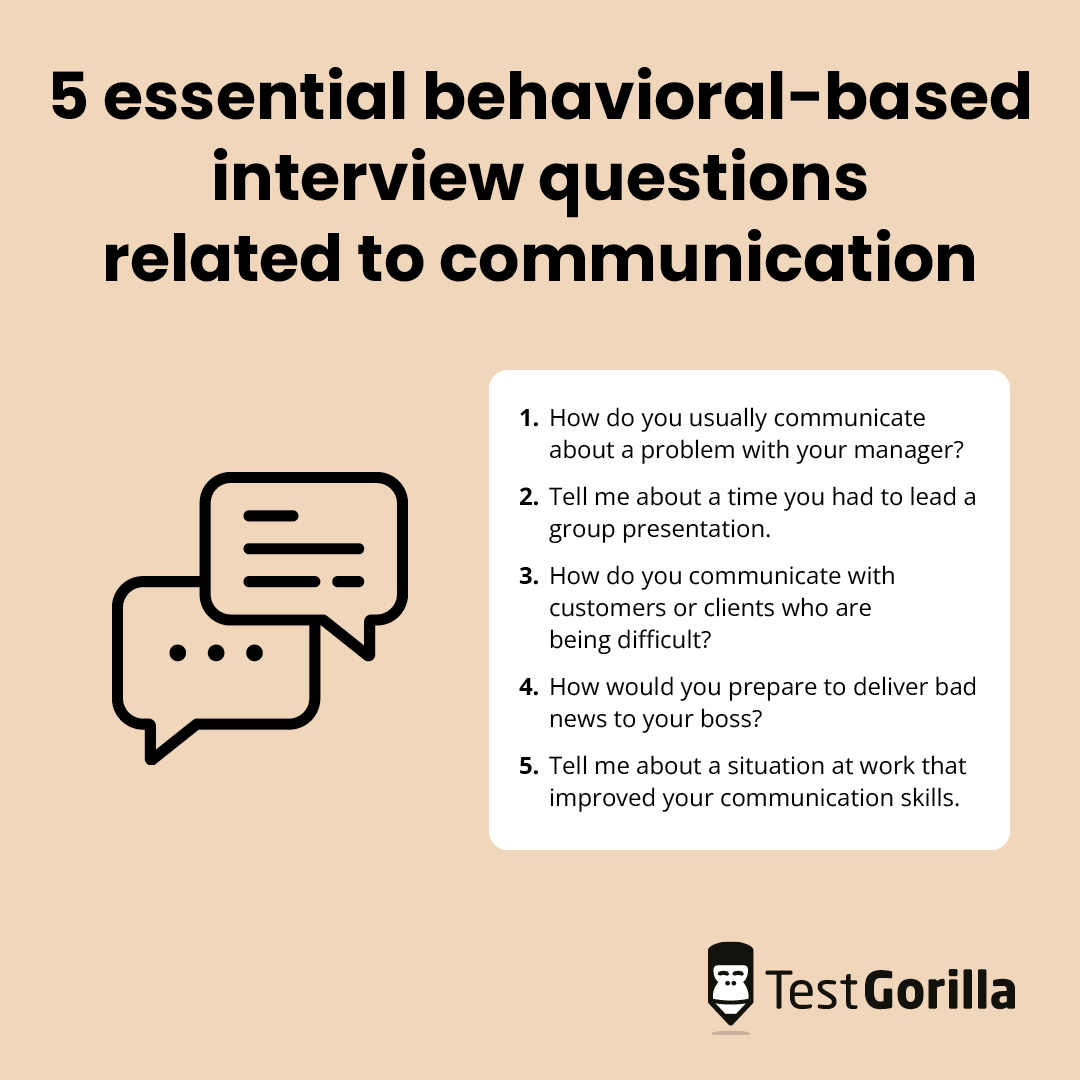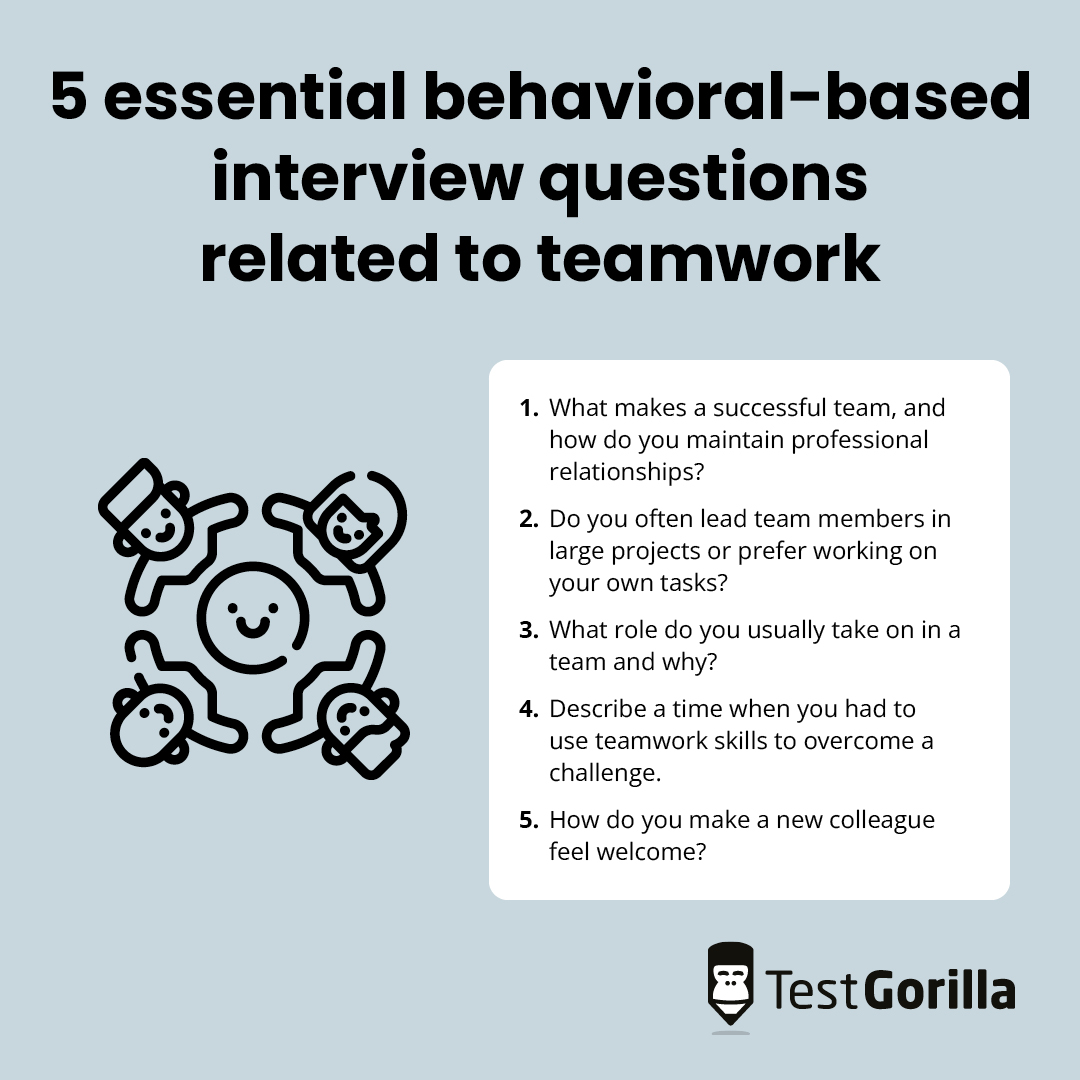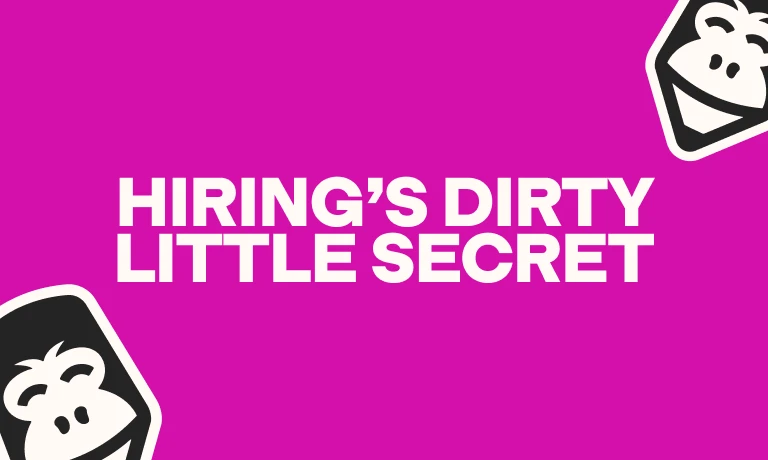50 behavioral-based interview questions to use in your next interview
When interviewing candidates, it’s essential to ask questions that will help you assess their skills, knowledge, and experience. By understanding their behavior in the workplace, you can make the best hiring decision.
An efficient screening process involves delving into your candidate’s behaviors and ways of thinking in specific scenarios. Although you can give them a Communication skills test before conducting the interview, it’s still important to question how they resolve team disagreements or express their thoughts at work.
Are you interested in conducting a behavioral interview but don’t know where to start? Don’t worry – we’ve created a definitive list of 50 behavioral-based interview questions you can ask candidates.
Table of contents
- Hire the best candidateswith TestGorilla.
- 20 general behavioral-based interview questions to ask your job applicants
- 5 essential general behavioral-based interview questions and answers
- 8 behavioral-based interview questions related to communication
- 5 essential behavioral-based interview questions and answers related to communication
- 10 behavioral-based interview questions related to teamwork
- 5 essential behavioral-based interview questions and answers related to teamwork
- 12 behavioral-based interview questions related to leadership
- 5 essential behavioral-based interview questions and answers related to leadership
- When in your hiring process should you use behavioral-based interview questions?
- For what roles can you use behavioral-based interview questions?
- Hire the right candidate using behavioral-based interview questions and TestGorilla’s assessments
Hire the best candidateswith TestGorilla.
Create pre-employment assessments in minutes to screen candidates, save time, and hire the best talent.
20 general behavioral-based interview questions to ask your job applicants
Learn how your candidates respond to common workplace dilemmas by asking them these 20 general behavioral-based interview questions.
How would you resolve a disagreement with one of your team members?
Tell us about a time you failed to reach your goals.
Can you give an example of how you manage interruptions in the workplace?
How do you meet deadlines when under pressure?
What is something you’re proud of and why?
Have you ever had to calm down an angry client or customer?
Describe a time you were stressed and how you handled it.
Do you have any measures in place to prevent stress?
What is the most challenging decision you’ve made at work, and what was the result?
Give me an example of an important goal and how you achieved it.
Do you often take the initiative in big projects?
Tell me about when you had to work with someone you didn’t get along with.
How do you handle new challenges? Give me an example.
Describe a time you had to motivate your colleagues.
Have you ever worked on multiple projects simultaneously, and how did you manage your time?
What is your approach after disagreeing with your boss?
Have you ever had to complete a task without proper training?
Explain your process of creating and sticking to a schedule.
Tell me about a major setback in one of your projects and how you dealt with it.
Do you often use your creativity when solving problems?
The best insights on HR and recruitment, delivered to your inbox.
Biweekly updates. No spam. Unsubscribe any time.
5 essential general behavioral-based interview questions and answers
Below are some answers to the most common behavioral-based interview questions. You can refer to them when listening to how candidates respond.
How would you resolve a disagreement with one of your team members?
Candidates should give examples of how they resolve workplace conflict. Everyone has a unique approach to team disagreements, so determining whether their approach aligns with your company is essential.
For example, the candidate might discuss how they used communication and problem-solving skills to understand a colleague’s frustration. Their responses should always be about work-related conflicts rather than personal matters.
According to research, more than 36% of employees deal with workplace conflict often. Therefore, you should hire candidates who are prepared for disagreements and can solve them peacefully.
Consider giving candidates a Problem-Solving test before the interview to evaluate how they identify and resolve conflict.
How do you meet deadlines when under pressure?
When candidates are honest about stress management, they are more likely to consistently meet deadlines in the workplace. A detailed answer may indicate that they’re open about their struggles and how they find it challenging to meet specific deadlines.
Candidates should give examples of their thought processes during stressful situations and how they eliminate distractions to finish on time.
If you want to learn more about your candidates’ ability to meet deadlines, send them a Time Management skills test to better understand how they prioritize, plan, and execute projects.
What is the most challenging decision you’ve made at work, and what was the result?
Decision-making is a crucial activity for many employees. More than half of the respondents to a McKinsey & Company survey reported spending more than 30% of their time at work making decisions, and more than a quarter reported spending most of their time on decision-making.
Furthermore, candidates with strong decision-making skills often have the abilities and knowledge to become dedicated leaders. They can lead projects and make tough decisions that other team members might struggle with.
In their response, the candidate should give a clear example of a challenge they faced and how they arrived at their final decision.
Have you ever had to complete a task without proper training?
This question enables candidates to discuss their creativity and how they took the initiative when completing tasks. They should provide an example of a project or duty they found challenging in the workplace.
For example, they might not have received training on how to use project resourcing software upon starting the job. By inquiring about their ability to think quickly, you can also learn more about their adaptability in a busy work environment.
Tell me about a major setback in one of your projects and how you dealt with it.
Everyone deals with setbacks and obstacles in projects. You can’t always avoid them, but you can learn to overcome them when meeting tight deadlines. Candidates should already have a toughened mindset for these types of scenarios.
One candidate might talk about a time their boss fell ill before an important client meeting. They could discuss their thought process behind arranging this meeting and taking the lead. This type of response indicates how strong their leadership, critical thinking, and communication skills are in challenging situations.
Give candidates a Critical Thinking skills test before the interview to understand their responses to inductive and deductive reasoning problems.
8 behavioral-based interview questions related to communication
Ask these eight communication-related questions in your behavioral interview to understand more about the candidate’s conversational skills.
How do you usually communicate about a problem with your manager?
Tell me about a time you had to lead a group presentation.
Have you ever been unable to get your point across clearly in the workplace?
Can you discuss a time you persuaded a team member to agree with your view?
How do you communicate with customers or clients who are being difficult?
What do you think is more important – being a good listener or a good communicator?
How would you prepare to deliver bad news to your boss?
Tell me about a situation at work that improved your communication skills.
5 essential behavioral-based interview questions and answers related to communication
Use these behavioral-based interview questions and answers to review your candidate’s responses after the interview.
1. How do you usually communicate about a problem with your manager?
Communication in the workplace is crucial because it boosts collaboration and employee morale. More than 34% of managers also prefer in-person communication when it comes to resolving problems. Therefore, candidates need strong communication skills to succeed in your team.
The candidate’s answer should include an example of how they would communicate about problems with their manager. For instance, they might arrange a one-to-one meeting or write down a list of notes to help them express their thoughts. Communication isn’t always verbal and can mean various things to different candidates.
Consider questioning them about communication types if you want a deeper understanding of their skills.
Tell me about a time you had to lead a group presentation.
This question requires candidates to guide you through their thought processes. Some candidates may have more experience than others when it comes to presenting. They should explain how they planned the presentation and communicated clearly to other team members.
Candidates with detailed answers likely have the most relevant experience and knowledge for the role in your organization.
How do you communicate with customers or clients who are being difficult?
The ideal candidate should provide a step-by-step answer to how they would communicate with challenging customers or clients.
Top applicants will describe a real scenario and use the STAR method to answer your question. This means they will explain the situation, think of an appropriate task, describe the actions they took to complete the task, and communicate the results.
How would you prepare to deliver bad news to your boss?
Being able to communicate both positive and negative information is vital in the workplace. Candidates should understand how to discuss problems or personal news with their manager.
The key word in this question is “prepare,” so make sure the candidate states how they would construct a plan that enables them to communicate openly and remain transparent.
Tell me about a situation at work that improved your communication skills.
A passion for self-improvement is one of the best traits a candidate can have. If they are aware of their unique skills, they are more likely to develop them in a career-focused environment.
The candidate should explain how they’ve developed their communication skills in previous jobs. For instance, they may attend regular teamwork sessions or group meetings that require individual presentations. Candidates who also request further training have the extra motivation and dedication needed to fulfill their roles.
10 behavioral-based interview questions related to teamwork
You can use these teamwork-related questions in your behavioral interview to learn more about the candidate’s collaboration skills. For more ideas, check out our selection of the best collaboration interview questions.
What makes a successful team, and how do you maintain professional relationships?
Tell me about a time your colleagues disagreed with your ideas.
Do you often lead team members in large projects or prefer working on your own tasks?
What role do you usually take on in a team and why?
Give me an example of how you would use your teamwork skills.
Have you ever worked with someone with an entirely different personality from yours?
Describe a time when you had to use teamwork skills to overcome a challenge.
In your opinion, what are the most important aspects of working as a team?
Have you ever had to resolve a conflict with another team member?
How do you make a new colleague feel welcome?
5 essential behavioral-based interview questions and answers related to teamwork
Check out these behavioral-based interview questions and answers to see how candidates should respond to teamwork-related questions.
What makes a successful team, and how do you maintain professional relationships?
The candidate should be open about their views on teamwork. Candidates value transparency at work if they believe honesty makes a team successful. Other job applicants might say that strong communication and goal-oriented mindsets help teams succeed on large projects.
Research suggests that 75% of employees rate teamwork as the most important aspect of their job. Having a robust support system can motivate everyone in the team, so aim to hire a candidate whose approach to teamwork suits your business.
To determine whether the candidate is a strong team player, you can also give them a personality test. Personality tests identify applicants’ prominent personality traits and how they are likely to behave in the workplace.
Do you often lead team members in large projects or prefer working on your own tasks?
This question helps you learn more about your candidate’s teamwork and leadership skills. They should tell you more about their independence and whether they prefer working on tasks alone or as part of a group. Their responses can be a good indication of their thoughts on teamwork.
The candidate might give an example of how they would lead a team. For instance, they could help assign roles in the team or collaborate with newer members who need extra guidance. If the candidate isn’t passionate about teamwork, they might not be suitable for a collaborative environment.
What role do you usually take on in a team and why?
There can be many roles in a diverse team – leaders, challengers, thinkers, and supporters can all contribute to a project’s success.
A leader is more forward-thinking than others and is likely to seek more opportunities for personal career growth. Challengers and thinkers are more creative when it comes to achieving positive outcomes. Supporters help prevent conflict and promote harmony within the team.
The candidate’s answer should help you decide whether they can successfully work in your team or if they may encounter difficulties working alongside other team members.
Describe a time when you had to use teamwork skills to overcome a challenge.
Look out for candidates who give specific examples in their response to this question. Their answer should tell you exactly when they use teamwork skills and how they plan on developing them.
They may, for example, describe how they handle a major setback in a project. A team leader might be off sick, so the candidate must fill in their role and regularly contact the other team members to ensure everyone is on duty.
How do you make a new colleague feel welcome?
This question might be simple, but it’s great for gaining more insight into the candidate’s personality. You can determine how friendly they are or what steps they would take to make a new team member feel comfortable.
It’s worth giving candidates a Culture Add test before the interview to see how their values and behaviors align with your organization.
12 behavioral-based interview questions related to leadership
Look through our 12 behavioral-based interview questions related to leadership, and decide which ones best suit your interview style.
How would you help another team member complete their tasks?
What is your leadership style in the workplace?
Have you ever served as a mentor to someone new on the team?
Tell me about a time you took the lead in the project and guided others through your processes.
How do you embody your values as a leader?
Describe a workplace challenge that encouraged you to use leadership skills.
If a team member isn’t doing their tasks properly, how do you approach them?
How do you respond to new ideas in the project?
Has there ever been a time you didn’t want to lead a specific team?
What is the hardest decision you’ve made when filling a leadership role?
How would you monitor a team’s performance?
As a leader, how do you respond to constructive criticism, and what is your approach to self-improvement?
5 essential behavioral-based interview questions and answers related to leadership
To evaluate a candidate’s response, review it against these leadership questions and answers.
Have you ever served as a mentor to someone new on the team?
Being a coach or mentor requires leadership qualities. Candidates who have experience in this area can guide others through a new project and provide them with valuable company resources. This question is key for roles that require leadership traits. The candidate should use a real example to show how they can take on bigger responsibilities.
Research has found that only 48% of employees believe their organization has high-quality leadership, so look out for candidates who have the potential to develop their skills and learn in the open position.
Give candidates a Leadership & People Management test before the interview to evaluate their leadership skills.
Tell me about a time you took the lead in the project and guided others through your processes.
This question will enable candidates to speak from their experiences. They can describe their own leadership processes and how they help to lead more extensive projects. An ideal candidate might explain different leadership styles and which one suits them best in the workplace.
If a team member isn’t doing their tasks properly, how do you approach them about it?
As a potential leader, the candidate should have an effective way of communicating about problems and helping other team members perform their tasks effectively. Applicants may give several answers to this question. Some candidates might be straightforward, whereas others take a softer approach when telling a colleague they’re doing something wrong.
What is the hardest decision you’ve made when filling a leadership role?
The most complex decisions can also be the most rewarding. Candidates should provide an example of a difficult decision and explain how their thought process led them to their final decision.
If you want to gain a deeper understanding of their decision-making skills, use a Business Judgment test. This comprehensive test covers challenging business decisions and evaluates the candidate’s ability to make the right trade-offs.
As a leader, how do you respond to constructive criticism, and what is your approach to self-improvement?
Acting on feedback is an excellent self-improvement practice. Candidates should always be aware of their skills and how they can develop them to become stronger leaders. They might request feedback from a manager before participating in suitable training sessions. This willingness to grow shows that the candidate is determined to lead a team.
When in your hiring process should you use behavioral-based interview questions?
You should use behavioral-based interview questions after candidates complete skills tests. This method makes shortlisting easier and ensures the candidates you choose have the correct traits and skills to fill the open position.
Before conducting an interview, send candidates relevant skills assessments to evaluate their knowledge and behaviors.
For what roles can you use behavioral-based interview questions?
Behavioral-based interview questions are suitable for any role involving constant teamwork and interaction. Use it when hiring for positions in a product team, including engineering, marketing, design, customer service, and product management roles.
Some businesses use behavioral interviews for managerial and executive roles since managerial positions require strong leadership and decision-making skills.
Candidates in such demanding roles need the appropriate skills and behaviors to succeed, so asking behavioral-based interview questions can help you test how they respond to challenging situations in the workplace.
And, if you need ideas for more questions, check out our 45 performance-based interview questions.
Hire the right candidate using behavioral-based interview questions and TestGorilla’s assessments
It’s not easy to perfect the hiring process and find the right talent. To hire more efficiently, send candidates a skills-assessment test. You can find a wide range of tests in TestGorilla’s test library to evaluate a candidate’s skills, knowledge, and experience in depth.
For leadership-related questions, you can use a Negotiation skills test. Create a free account on TestGorilla today to identify suitable candidates and gain a better understanding of their behavior in the workplace.
You've scrolled this far
Why not try TestGorilla for free, and see what happens when you put skills first.























